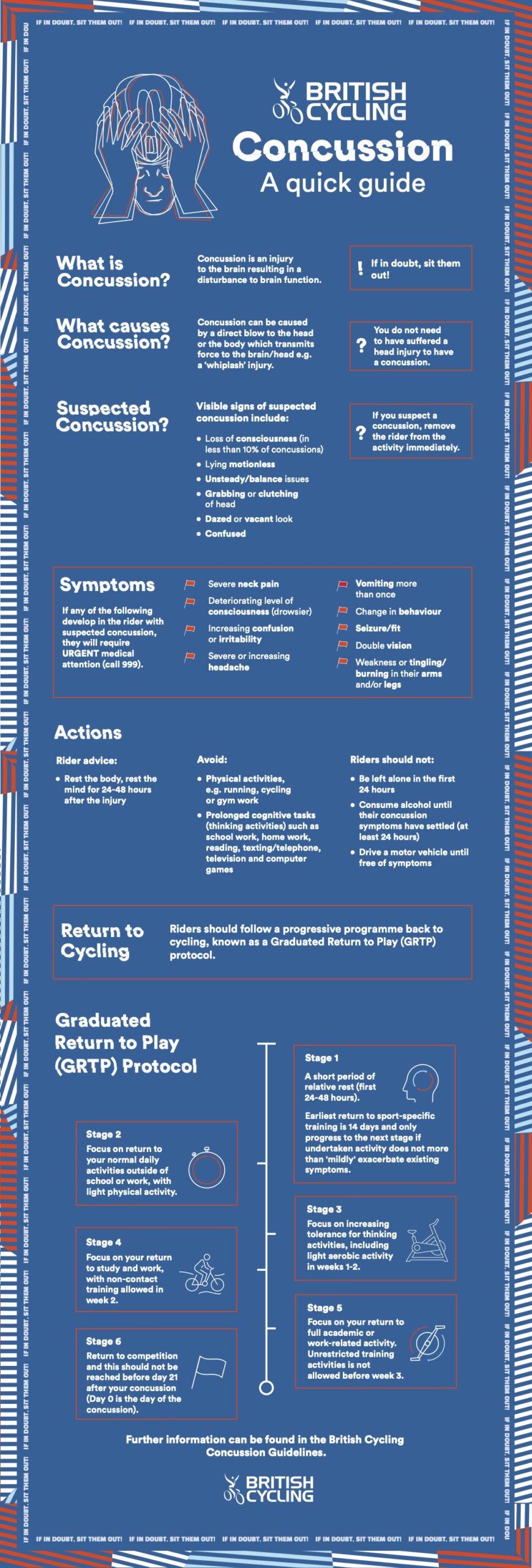We admit we’re a little surprised to see this headline – we had sort of assumed British Cycling already had policies about this. We’ve been writing stories about concussion risks since at least 2017, and by 2018 the EWS and Crankworx had concussion protocols in place.
It turns out that they’ve had one their elite riders on the GB Cycling, but not for British Cycling events and event organisers. British Cycling has been waiting on out own government, which was supposed to be issuing guidance, but with all the musical chairs in the Department for Media, Culture and Sport, they’ve kept delaying it. So British Cycling has given up waiting and – before the race season gets underway – introduced Concussion Guidance that is aimed at BC sanctioned events and BC organised recreational riding (eg Breeze rides). Elite riders on the GB Cycling Team still have their own, separate, concussion guidance.
Here’s the PR…
British Cycling has today published its first Concussion Guidance for sanctioned events and recreational activities, along with the launch of a new, free e-learning module to raise awareness of how concussion can be safely managed across all levels of the sport.
Based on the principle of ‘If in doubt, sit them out’, the guidance recommends that those sustaining a suspected concussion be immediately removed from cycling activity until appropriate treatment has been administered, and should not ride again that same day. In line with the Graduated Return to Play (GRTP) protocol, those who experience concussion symptoms – however mild – should follow a progressive programme back to full activity and should not return to competition for at least 21 days.

The guidance provides information on the common symptoms of concussion, the vital role of coaches, parents and riders, and advice on returning to cycling activity in line with the GRTP protocol. In addition to the guidance, British Cycling has also released an infographic poster for event organisers, coaches and clubs, and a free e-learning course, which can be accessed from today.
The guidance is based on the latest evidence and best practice from around the world, and discussions with a broad range of sports bodies and stakeholders.
Led by our Chief Medical Officer, Dr Nigel Jones, British Cycling has been at the very forefront of tackling the issue of concussion in cycling. Since its introduction in 2018, the Great Britain Cycling Team’s own concussion protocol for use in UCI international events has been adopted by many other national federations, and Jones supported the development of the UCI’s first policy on the matter, which was published in December 2020. In 2020 the Great Britain Cycling Team was awarded Care Quality Commission (CQC) status, in recognition of its work to provide riders with safe, effective, compassionate and high-quality care.
Ahead of the publication of today’s guidance, Dr Nigel Jones said:
“In my time working with the Great Britain Cycling Team we’ve made excellent progress on educating riders, coaches and staff on the risks of concussion, and how we manage them appropriately to ensure that riders take the time they need to fully recover.
“The guidance for the wider sport which we are publishing today is another really positive step forward, and with the support of our resources and e-learning I hope that we will start to bust some of those stubborn myths about concussion and give people in the sport the tools and knowledge they need to keep riders safe.
“The message is really clear – for the safety of the injured rider and those they are riding with, if in doubt, sit them out.”
The introduction of the guidelines has been further strengthened by an amend to British Cycling’s Technical Regulations, which gives Commissaires and Referees the power to withdraw a rider from an event if they believe that their participation would affect the safety of that rider or others.
The updated regulations state that riders must withdraw themselves before or during an
event if they have sustained any injury which could affect their ability to participate safely, and if they fail to do so, a Commissaire may withdraw them if they consider their participation would affect the safety of the rider and/or other riders in the event (Technical Regulations G5 13.2 and 13.3).
Commissaires and Officials have been consulted throughout the development of the guidelines, with further input from British Cycling’s Integrity Committee and Board of Directors.
British Cycling’s Acting CEO, Danielle Every, said:
“Recognising the importance of the issue, we’ve been through an incredibly rigorous and collaborative process to arrive at the guidelines published today, and I want to thank our staff, volunteers and colleagues in the wider sector who have offered their invaluable insight and support.
“Keeping riders in our sport safe will always be our top priority, and we know that the level of understanding about concussion and its impact currently varies hugely across our communities. Our focus therefore now switches to ensuring that the guidelines, our digital learning offer and other resources are seen and shared far and wide.”
Concussion research continues to evolve rapidly, and therefore these guidelines will be continually monitored and updated as and when required. For more information about our regulations and policies, email techregs@britishcycling.org.uk.
We’ve not had long to look over the guidance before this news came out, but one line certainly jumps out at us:
‘Wearing a helmet or mouth guard does not protect you from suffering a concussion.’
We’ve checked with British Cycling and they’re not suggesting that helmets and mouth guards don’t provide any protection – they’re saying this protective equipment doesn’t give you total protections. We’ve already suggested that perhaps the guidance should read ‘prevent’ rather than ‘protect’?
Another point to note is this:
If a rider does have a damaged helmet in an activity where a helmet is required, they must be withdrawn from the race regardless of whether they are displaying any other symptoms of concussion.
The previous point talks about helmet damage in terms of cracks or dents, so perhaps it’s not a blanket ‘all damage’. Anyway, it’s just another good reason why you should make sure your helmet is in good condition – or you could find yourself being excluded from activities if people think you’ve only just crashed. It’ll be interesting to see how this guidance translates to races this season.
One final point to note is that this guidance only deals with impacts which cause concussion, or suspected concussion. It doesn’t get into the potential effects of repeated sub-concussive impacts, which are also thought to be a risk. In the NFL, players are now monitored and the cumulative effect of smaller impacts can cause a player to be removed from the field. Perhaps when the DCMS guidance is published we will see this issue being addressed. Watch this space…






